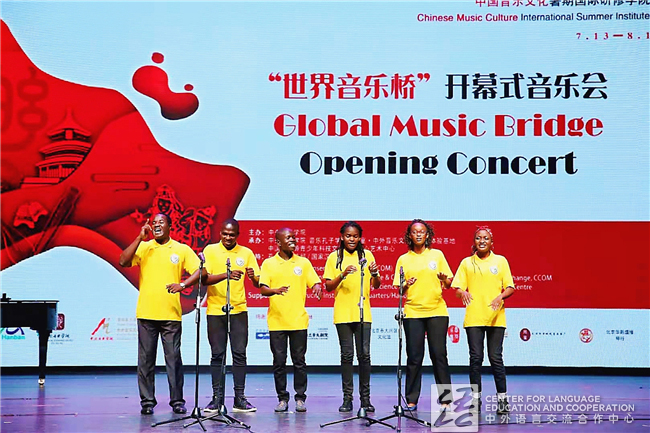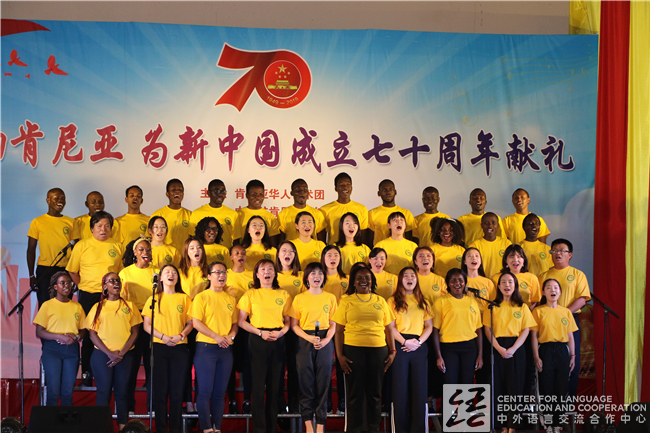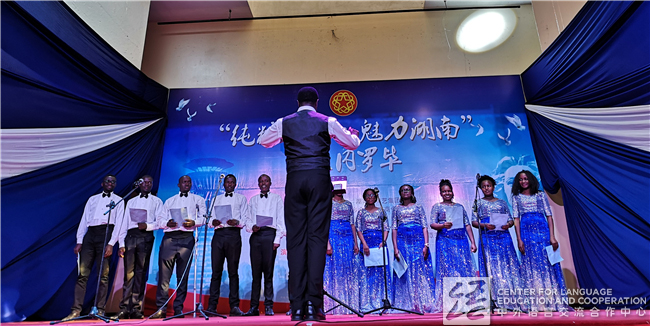Chinese Choir of Confucius Institute at the University of Nairobi, Kenya
Information Sources:CRI Online, WeChat public account "Director of the Confucius Institute", WeChat public account "Confucius Institute", Center for Language Education and Cooperation
The Chinese choir of Confucius Institute at the University of Nairobi was established at the end of 2008. Sa Dequan, the Chinese director of the Confucius Institute of the University at the time, said that the original intention of the establishment of the Chinese choir was to use a cultural entity to carry out cultural exchanges and spread Chinese culture. With the development of the choir, the number of students from Nairobi who signed up to study Chinese language has gradually increased, and their interest in Chinese culture has also gradually grown.
To cooperate with the Chinese language teaching, at the beginning of the choir's establishment, the Confucius Institute at the University of Nairobi arranged for professional Chinese volunteer teachers to guide the Chinese learning of the choir members. These teachers usually make teaching plans carefully, introduce the background and lyrics of songs, correct students' pronunciation word by word, and then introduce teaching parts such as learning Chinese pinyin and writing Chinese characters.

On July 13, 2018, the International Summer School of Chinese Music Culture was opened. This activity was hosted by the Central Conservatory of Music and opened with the theme of "Music as the Eye, Culture as the Bridge" 2018 Understanding China with Music. The University of Nairobi Choir performed a cappella Hello, Friends at the opening ceremony.
Since the establishment of the choir, the members have attended the winter camp every year at Tianjin Normal University, which is a co-founder of the Confucius Institute at the University of Nairobi. They would have a month-long intensive training to study the Chinese language and Chinese culture.
The winter camp not only improved the students' music and Chinese language level, and creates a good Chinese language learning environment for the students, but also leads them to experience the broad and profound Chinese culture and the charm of Chinese music. It will better serve the cultural exchanges between China and Kenya, and will contribute to the people-to-people bond.
The Chinese Choir of Confucius Institute at the University of Nairobi is characterized by four vice-type chorus without cappella. Thus, Tianjin Normal University specially selected the chorus songs and re-arranged them to give full play to the choir's timbre. This entertaining way of learning has stimulated the choir members' interest in learning.
Since the establishment of the choir, with the continuous inheritance and innovation of more students at the University of Nairobi, the choir has as many as 16 classic Chinese songs, such as Song and Smile, Tao Magan(Horse Pole), Good Days, Defend the Yellow River, etc.
Tao Magan (Horse Pole)
The choir's outstanding performance has made it more famous. The choir has been present in many events of the Kenyan government, the Spring Festival reception gala of the Chinese Embassy in Kenya, and the condolences of various Chinese-funded enterprises.
For example, at the 68th National Day Reception Gala of the Chinese Embassy in Kenya, the Chinese choir of Confucius Institute at the University of Nairobi sang the classic songs Jambo (Hello), Half Moon Climbs, Kangding Love Song and Malaika, etc., and the audience praised the choir. The performance ended in The Same Song sung by the choir and all teachers and students.

On September 21, 2019, in the "Sing Kenya, Celebrate the 70th Anniversary of the Founding of China" chorus competition, which was hosted by the Kenyan Chinese Art Troupe and co-organized by the Chinese Embassy in Kenya, all teachers of the Confucius Institute at the University of Nairobi participated together with the choir and won the laurel with the song Defend the Yellow River.
Justin Muturi, Speaker of parliament of the Kenyan government, and other leaders have expressed their condolences to the Confucius Institute at the University of Nairobi. They highly appreciated the performance of the choir, and fully affirmed the work done by the Confucius Institute at the University of Nairobi in international Chinese language education and Chinese culture dissemination, as well as its achievements in promoting cultural exchanges between China and Kenya. At the same time, they hope that the Confucius Institute at the University of Nairobi will make persistent efforts.

On December 13, 2019, the art tour of "Pure China, Charming Hunan, Gathering in Nairobi" entered Kenya. The Confucius Institute Choir at the University of Nairobi sang My Motherland, and the Chinese audience cheered and applauded.
Peter Mbithi, President of the University of Nairobi in Kenya, said at the 2018 Beijing Summit of the Forum on China-Africa Cooperation: "Our Confucius Institute Choir has become the most prestigious Chinese choir in East Africa, and they are indispensable for major China-Africa events."
Ma Xiyou (Chinese name), a fourth-year student of the Confucius Institute at the University of Nairobi, is one of core members of the Chinese choir. He believes that singing Chinese songs can help him learn Chinese culture: "Now we can sing a total of 20 Chinese songs, such as Back to My Mother's Home, Half Moon Climb, and Song and Smile. We like to sing Chinese songs, because I think Chinese culture is a very good culture, and we can learn Chinese culture when we sing."
Zhang Meiling (Hilda Juma), a member of the choir, is the champion of the 17th "Chinese Bridge" Chinese Proficiency Competition for Foreign College Students in Kenya. She said: "Learning Chinese songs is very interesting. The teacher told me the meaning of the song and what the song wants to express, and corrected my pronunciation. These were very helpful for me to learn Chinese and inspired me to explore Chinese. Therefore, I chose Chinese language as my undergraduate major, and I hope that I can study Chinese in an in-depth and systematic way. In the future, it is my dream to have the opportunity to study in China for graduate school!”

